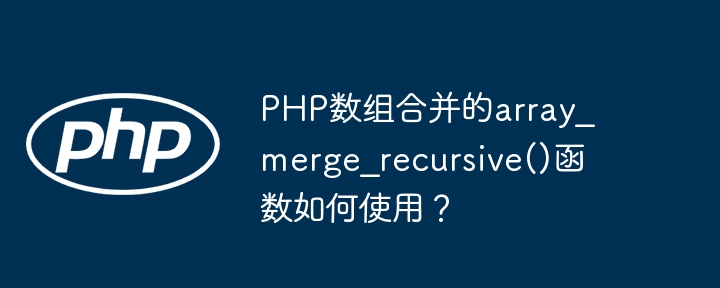
array_merge_recursive() function recursively merges the keys and values in the array to create a new array. The syntax is array_merge_recursive(...$arrays), the parameter is the array list to be merged, and the return value is the merged new array. This function recursively processes nested arrays, with unique keys and overwritten values when merging.

PHP uses the array_merge_recursive() function to merge arrays
Introduction
array_merge_recursive() Function can be used to merge two or more arrays, it will recursively merge the keys and values in the arrays, thereby creating a new array.
Syntax
array_merge_recursive(...$arrays);
Where ...$arrays represents the array list to be merged.
Parameters
Return value
This function returns a merged new array.
Practical case
The following code example demonstrates how to use array_merge_recursive() Function:
<?php
// 创建两个数组
$arr1 = array("a" => "apple", "b" => "banana");
$arr2 = array("b" => "berry", "c" => "cherry");
// 使用 array_merge_recursive() 合并数组
$mergedArray = array_merge_recursive($arr1, $arr2);
// 打印合并后的数组
print_r($mergedArray);
?>Output:
Array
(
[a] => apple
[b] => berry
[c] => cherry
)Note:
array_merge_recursive() Arrays nested within arrays will be processed recursively when merging arrays. array_merge() function. array_replace_recursive() function. The above is the detailed content of How to use the array_merge_recursive() function of PHP array merging?. For more information, please follow other related articles on the PHP Chinese website!
 setInterval
setInterval
 What is the shortcut key for brush size?
What is the shortcut key for brush size?
 Detailed explanation of linux dd command
Detailed explanation of linux dd command
 How to solve disk parameter errors
How to solve disk parameter errors
 What are the SEO diagnostic methods?
What are the SEO diagnostic methods?
 What are the css3 gradient properties?
What are the css3 gradient properties?
 The most promising coin in 2024
The most promising coin in 2024
 What does pycharm mean when running in parallel?
What does pycharm mean when running in parallel?
 The difference between PD fast charging and general fast charging
The difference between PD fast charging and general fast charging




